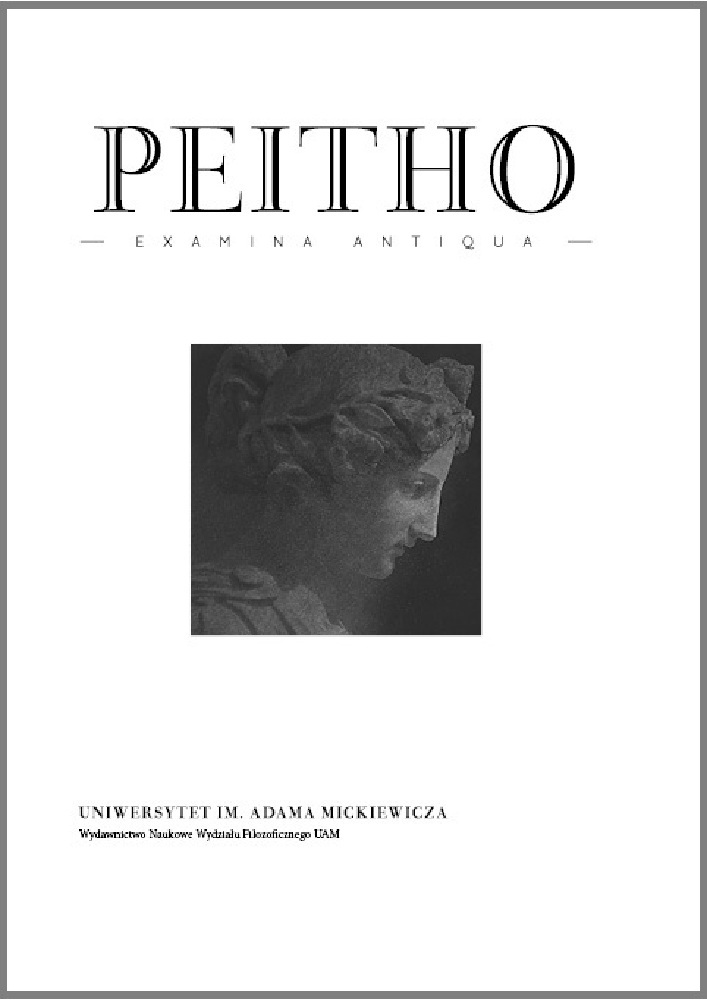Abstract
The present paper deals with eight charges that are frequently leveled against any research that focuses on the agrapha dogmata. The charges are demonstrated to be completely unfounded and, therefore, duly dismissed. In particular, it is argued here that the phrase ta legomena (so‑called) is by no means to be understood as ironic. Consequently, the article rejects the very common picture of Plato as some sort of dogmatist and author of a fixed philosophical system. However, Plato’s philosophy is presented as rather ‘overt’ and ‘straightforward’ in its nature. With the situation being as it is, thorough knowledge of the agrapha dogmata is shown to be an absolute prerequisite for understanding Plato’s dialogues. The paper concludes with an observation that while investigating the issue is completely warranted and does not in any way entail any devaluation of the dialogues, Aristotle’s testimony must also be taken into account.
References
Albert, K., 1989, Über Platons Begriff der Philosophie, Sankt Augustin.
Albert K., 1991, O platońskim pojęciu filozofii, przeł. J. Drewnowski, Warszawa.
Barnes, J., 1985, The Complete Works of Aristotle. The Revised Oxford Translation, Oxford.
Carteron, H., 1966, Aristote. Physique, Paris.
Cherniss, H., 1935, Aristotle’s Criticism of Presocratic Philosophy, Baltimore.
Cherniss, H., 1944, Aristotle’s Criticism of Plato and the Academy, Oxford.
Cherniss, H., 1945, The Riddle of the Early Academy, Berkeley — Los Angeles.
Dirlmeier, F., 1969, Aristoteles. Nikomachische Ethik, Darmstadt.
Elze, M., 1972, „Dogma”, w: J. Ritter (Hrsg.), Historisches Wörterbuch der Philosophie, Basel — Stuttgart, s. 276.
Ferber, R., 1991, Die Unwissenheit des Philosophen oder Warum hat Platon die ‘ungeschriebene Lehre’ nicht geschrieben?, Sankt Augustin.
Gaiser, K., 1968, Platons ungeschriebene Lehre, Stuttgart.
Gill, Ch., 1993, „Platonic Dialectic and the Truth‑Status on the Unwritten Doctrines”, Methexis 6, s. 55—72.
Guthrie, W.K.C., 1957, „Aristotle as Historian of Philosophy: Some Preliminaries”, JHS 77, s. 35—41.
Guthrie, W.K.C., 1962, A History of Greek Philosophy, vol. I, Cambridge.
Guthrie, W.K.C., 1965, A History of Greek Philosophy, vol. II, Cambridge.
Hardie, R.P., Gaye, R.K., 1985, The Complete Works of Aristotle, vol. I: Physics, Princeton.
Jaeger, W., 1937, „Rezension: Cherniss: Aristotle’s Criticism of Presocratic Philosophy”, AJPh 58, s. 350—356.
Hegel, G.W.F., 1996, Wykłady z historii filozofii, t. II, przeł. Ś.F. Nowicki, Warszawa.
Kant, I., 2005, „Do wiecznego pokoju”, w: idem, Rozprawy z filozofii historii, przeł. T. Kupś, D. Pakalski,
A. Grzeliński, M. Żelazny, Kęty, s. 164—203.
Krämer, H.J., 1968, „Die grundsätzlichen Fragen der indirekten Platonüberlieferung”, w: W. Schadewaldt and H.‑G. Gadamer (Hrsg.), Idee und Zahl. Studien zur platonischen Philosophie, Heidelberg, s. 106—133.
Krämer, H.J., 1988, „Fichte, Schlegel und der Infinitismus in der Platondeutung”, Deutsche Vierteljahresschrift für Literaturwissenschaft und Geistesgeschichte 62, s. 583—621.
Krämer, H.J., 2006, Fichte, Schlegel i infinityzm w interpretacji Platona, przeł. A. Gniazdowski, Warszawa.
Kuhn, Th., 1963, Struktura rewolucji naukowych, przeł. H. Ostromęcka, Warszawa.
Kühner, R., Gerth, B., 1983, Ausführliche Grammatik der griechischen Sprache, Darmstadt.
Reale, G., 1991, Platone. Tutti gli scritti, Milano.
Maurer, R., 1970, Platons ‘Staat’ und die Demokratie, Berlin.
Morrow, G., 1960, Plato’s Cretan City, Princeton.
Oehler, K., 1965, „Der entmythologisierte Platon”, ZPhF 19, s. 393—420.
Pierart, M., 1974, Platon et la cite grecque. Théorie et réalité dans la constitution des Lois, Bruxelles.
Popper, K.R., 1993, Społeczeństwo otwarte i jego wrogowie, t. 1: Urok Platona, przeł. H. Krahelska, Warszawa.
Ross, W.D., 1924, Aristotle’s Metaphysics. Α Revised Text with Introduction and Commentary, Oxford.
Ross, W.D., 1951, Plato’s Theory of Ideas, Oxford.
Szlezák, T.A., 1979a, „Dialogform und Esoterik”, MH 36, s. 354—363.
Szlezák, T.A., 1979b, „The Acquiring of Philosophical Knowledge According to Plato’s Seventh Letter”, w: G.W. Bowersock, W. Burkert and M.C.J. Putnam (eds.), Arktouros. Hellenic Studies presented to Bernard M. W. Knox on the occasion of his 65th birthday, Berlin — New York, s. 354—363.
Szlezák, T.A., 1987, „Die Lückenhaftigkeit der akademischen Prinzipientheorien nach Aristoteles’ Darstellung in Metaphysik Μ und N”, w: A. Graeser (ed.), Mathematik und Metaphysik bei Aristoteles. Akten des X. Symposium Aristotelicum, Bern, s. 45—67.
Szlezák, T.A., 1985, Platon und die Schriftlichkeit der Philosophie, t. I: Interpretationen zu den frühen und mittleren Dialogen, Berlin.
Szlezák, T.A., 1989, „Struttura e finalità dei dialoghi platonici. Che cosa significa «venire in soccorso al discorso»”?, Rivista di Filosofia neo‑scolastica 81, s. 523—542.
Szlezák, T.A., 1990, „Zum Kontext der platonischen timiètera. Bemerkungen zu Phaidros 278 b—e”, Würzburger Jahrbücher f.d. Altertumswiss 16, s. 75—85.
Szlezák, T.A., 1991, „Recensione: M. Tulli, Dialettica e scrittura nella VII Lettera di Platone”, Gnomon 63, s. 360—362.
Szlezák, T.A., 1992, Was heisst „dem Logos zu Hilfe” kommen? Zur Struktur und Zielsetzung der platonischen Dialoge, w: L. Rossetti (ed.), Understanding the Phaedrus. Proceedings of the II Symposium Platonicum, Sankt Augustin, s. 93—107.
Szlezák, T.A., 1993a, „Zur üblichen Abneigung gegen die Agrapha Dogmata”, Méthexis 6, s. 155—174.
Szlezák, T.A., 1993b, Platone politico, Roma.
Szlezák, T.A., 1997, Czytanie Platona, przeł. P. Domański, Warszawa.
Szlezák, T.A., 2004, Platon und die Schriftlichkeit der Philosophie, t. II: Das Bild des Dialektikers in Platons späten Dialogen, Berlin.
Szlezak, T.A., 2005, „Luki w akademickiej teorii zasad według prezentacji Arystotelesa (Metafizyka M i N)”, w: idem, O nowej interpretacji platońskich dialogów, przeł. P. Domański, Kęty, s. 175—199.
Wagner, H., 1972, Aristoteles. Physik‑Vorlesung, Darmstadt.
Wieland, W., 1982, Platon und die Formen des Wissens, Göttingen.
Wippern, J., 1972, Das Problem der ungeschriebenen Lehre Platons, Darmstadt.
License
Peitho provides immediate open access to its content on the principle that making research freely available to the public supports a greater global exchange of knowledge.
